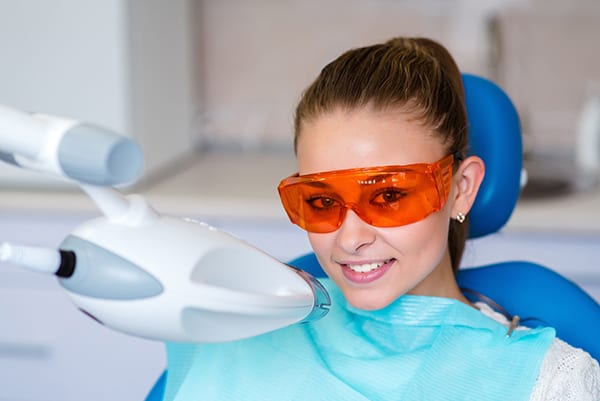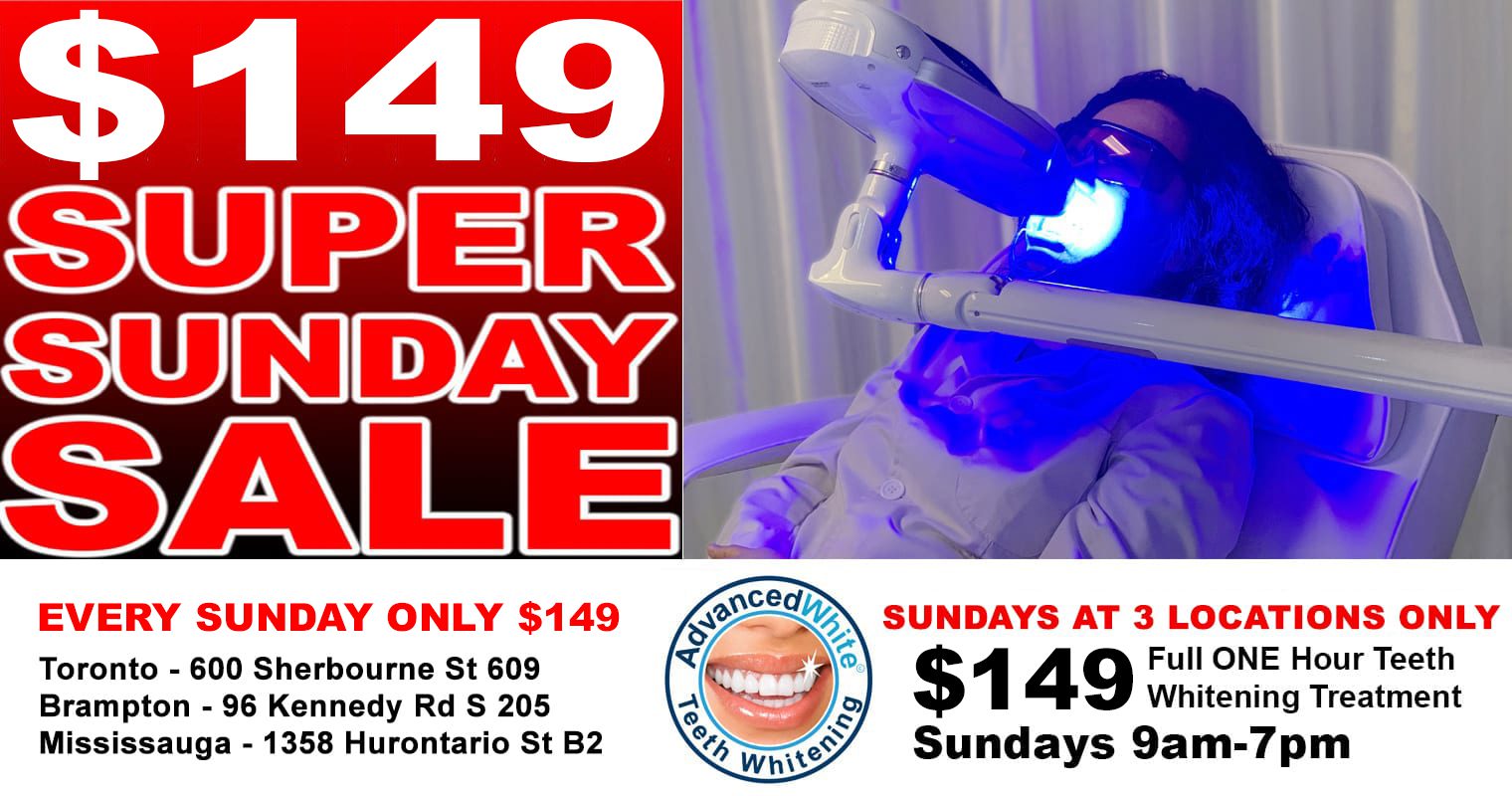
Table of Contents
Teeth Whitening Services
To give yourself a brighter smile, you can try out teeth whitening services, which involve several cosmetic procedures to whiten your teeth. What are your teeth whitening options? Some can be completed at home using kits or items for teeth whitening, while others can be completed at your dentist’s office or at a professional teeth whitening clinic such as Advanced White. Typically, health insurance doesn’t pay for whitening procedures.
The gums and teeth may become irritated and sensitive to sure of the chemicals used in teeth whitening procedures. Always follow product instructions while using a product.
Consider incorporating whitening toothpaste or mouthwash into your dental hygiene regimen if you have light tooth discoloration. Avoiding substances like coffee and wine that are known to discolour your teeth may also be beneficial. You could wish to try an at-home whitening kit or speak with your dentist about in-office whitening sessions if the discoloration is more obvious.
Whatever choice you make, you shouldn’t feel self-conscious about your smile. Your teeth’s health and functionality are what matter most. Although many people believe that whiter teeth boost confidence, it’s necessary that we lessen the stigma associated with the vast, natural variation of smiles.
In order to make stained teeth look better, teeth whitening is a popular and reasonably priced technique. Your dentist will administer the most secure, successful treatment. The efficacy and safety of over-the-counter remedies can vary.
Description of teeth whitening?
Bleaching is used in teeth whitening to lighten the colour of the teeth. The teeth normally look slightly lighter after treatment, although not always very white.
It is exceedingly uncommon for teeth whitening to be necessary; it is an elective operation.
The chemical hydrogen peroxide or carbamide is often used in whitening goods. The most concentrated and potent whitening products can only be used legally by licensed dental professionals.
The dentine, the largest portion of the inside of the tooth and a little softer than the enamel, absorbs the bleach through the tooth’s top layer of enamel. The discoloration is caused by the bleach’s reaction with colored molecules. The teeth then appear whiter as the dentine becomes lighter. Additionally, bleaching the enamel surface can make it more reflective and appear whiter.
When might whitening teeth be necessary?
Discoloration of teeth is caused by: Smoking, tea, coffee, red wine, or cola, and the excess amount of fluoride or tetracycline (i.e., an antibiotic) when the teeth are forming.
If you’ve been considering about getting your teeth whitened, confirm with your dentist to check if it’s a great idea to be done on your teeth.
It is not advisable to whiten your teeth if you: have sensitive teeth, are pregnant or are currently breastfeeding, have gum disease or shrinkage, have cracks or exposed dentine.
It’s important to note that whitening treatments will not whiten existing crowns, veneers, or fillings.
Additionally, teeth whitening services are provided by unlicensed, unregulated professionals in locations such as salons, shopping centers, beauty parlors, and mobile businesses. Numerous non-dental practitioners that offer teeth whitening services make the claim that their practitioners are “teeth whitening specialists” with the skills or education necessary to carry out teeth whitening procedures securely. Dental Associations advise that only licensed dentists have the knowledge and skill to determine whether bleaching is safe for you, to suggest the most suitable method and materials, and to deliver care that complies with safety and quality standards.
What occurs during a teeth-whitening treatment?
Bleaching; To start, your dentist will make molds of your top and bottom teeth. These are used to create bespoke mouthguard-like trays that fit over your teeth.
The bleaching gel is placed in the mouthpiece trays at your subsequent sessions and you will wear them in your mouth for about 15 to 30 minutes. To hasten the whitening process, the dentist could also use a light. The procedure is frequently repeated at home while adhering to the dentist’s instructions. In two to four weeks, you’ll likely see a change.
Another choice is to get a kit with personalized trays from your dentist and do the procedure at home.
Power bleaching; In the clinic, it is generally referred to as laser whitening. Your dentist will, first of all, cover your gums before then proceeding to apply a whitening substance to your teeth. To begin the whitening process, a laser beam is shone. It usually only requires one treatment, which takes around 60 minutes.
What to anticipate following teeth whitening treatment?
Although teeth whitening is frequently successful and can last for several years, it is not permanent. For instance, red wine, tea, and coffee can re-stain your teeth.
Benefits and risks of a teeth whitening treatment
Discoloured teeth can look better after teeth whitening. It is also less expensive than some alternative restorative techniques. Before starting therapy, be sure to learn about the price, dangers, and expected results.
The most typical adverse effects, which are frequently brief, include tooth sensitivity, mostly from power bleaching, discomfort, and irritation of the gums.
What is the price of teeth whitening?
Bleaching at the dentist’s office with home follow-up costs $500 to $1500 per arch.
Home bleaching with dentist-supplied trays costs $250 to $450 per arch.
ADVANCED WHITE PROFESSIONAL TEETH WHITENING CLINICS $179 ($149 on Sundays)
Dental hygiene Recommendations
In addition to preventing cavities and gingivitis, maintaining clean and flossed teeth will keep teeth at their whitest.
At least twice daily, especially after meals, brush your teeth.
If you consume foods or beverages that stain your teeth, brush them immediately. If not, wait 30 minutes. If you consume foods or beverages that are acidic, brush right away.
After eating, rinse with water or chew sugar-free gum.
Between whitening treatments, incorporate a whitening mouthwash or toothpaste into your usual dental practice.
Eating advice for white teeth
The foods and beverages you consume can discolour your teeth, especially if you don’t brush them frequently. Typical offenders include tea, coffee, wine, cola, and grape juice.
If you frequently consume these, brush, floss, and rinse.
By encouraging saliva production, chewing sugar-free gum, parsley, or mint can also aid in mouth cleaning.
Bottomline on Teeth Whitening in Toronto
There are numerous at-home and professional tooth whitening treatments and techniques available.
Although at-home whitening remedies like whitening toothpaste, rinses, and pens don’t work very long, they can help extend the results of other, more potent whitening procedures.
White strips are the best over-the-counter teeth whitening product you may use without a dentist’s supervision.
The best whitening option is to come to in-clinic professional teeth whitening, such as Advanced White Laser Teeth Whitening Services in Toronto, Richmond Hill, Mississauga, Brampton, and Markham. CLICK HERE

